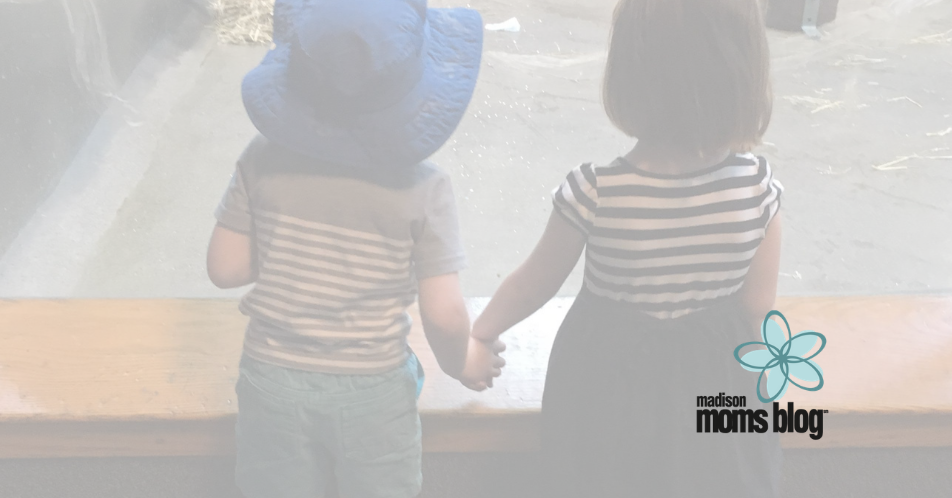
Kids are, by nature, impulsive beings. They touch everything and everyone constantly. Which is why we don’t think twice when our kids touch or hug another child. Only when the other child responds negatively do we talk to our kids about why they shouldn’t do this. But this reactive approach is part of the reason why the #MeToo movement exists. So let’s do something about this and switch to a proactive response. I propose we talk about consent on a routine basis. And let’s start the conversation early in our children’s lives.
But where do we start? I Googled “teaching consent to toddlers” and found hundreds of articles. Some were better than others, but after reading a few of them, I discovered the following overarching themes:
Teach how to ask for permission and which words to use
Kids do and ask later, so it’s up to us to help guide our children when it comes to social norms. If you notice your child is about to touch another child, remind them to ask for permission first. Model the language they should use. Tell them to say things like, “May I hold your hand while we play?”. If the other child says no, or does not respond, teach your child to respond in a way that accepts the other child’s wishes. Suggest something like, “That’s okay, sometimes I don’t like to be touched either.” Not only does this help reinforce the idea that we should always ask for consent before we touch another person, but it also helps with impulse control. It places another layer of thought before the action.
Teach that consent can be given and taken away at any time
Our society struggles with understanding that if someone said ‘yes’ to something once, or 10 minutes ago, the ‘yes’ still applies now. This isn’t the case, and we should teach our children this early on so it isn’t a foreign concept for them. It should be normal, and automatic, for them to periodically check in with the other child to see if it’s still okay to touch them. And because this is important to fully understand, I’m going to also point out the obvious… If a child says they would like a hug, it doesn’t mean they would like a kiss or any other type of physical touch. We need to instill in our kids that consent requires a significant amount of communication and that we need to always be aware of the other person’s words, feelings, and actions.
Discuss the importance of “no”, “stop”, and more importantly, a non-response
We all know when someone says “no” or “stop” that the other person does not want us to start, or continue with, what we are doing. These are easy, and important, things we should be teaching our children. However, we should also be teaching our kids that just because someone didn’t say “no” that it doesn’t mean they said “yes”.
Now some of you may be thinking, “Yeah, but this really only applies to sexual contact.” But I think Patrick Coleman from Fatherly.com said it best when he said, “Teaching a kid about consent has nothing to do with teaching them about sex. It’s about respecting boundaries.” We need to emphasize the importance of waiting for a clear signal before proceeding with the intended action. For the sake of simplicity, we should tell our kids if we don’t hear the words “yes”, or some iteration of this word, consent is not given.
The other thing we need to be aware of is we should never force our children to hug, kiss, or be touched by someone else if it goes against their wishes; even if it’s a relative. By forcing them to do these things we are sending the signal that their desire to not want to be touched isn’t an acceptable answer. I know I have been guilty of this in the past with my oldest child, and I plan to work harder at respecting his wishes on this matter.
Encourage your child to be empathetic and to read other people’s body language
It’s not easy for kids to empathize with others. But the good news is that teaching about consent is also a perfect opportunity to teach a little bit of empathy. If the other child becomes upset, or hurt, by our child’s actions, we can use it as a teachable moment. Try and gently encourage your child to think about the situation from the other child’s perspective. The more practice we give them at this the better they will become.
The same should be said about helping our kids read other people’s body language. As adults, we often have the ability to know whether someone is feeling sad, mad, scared, or anxious just by reading the other person’s body language. Part of teaching about consent is helping our kids read the body language of others. So, play games with your kids by having them try to guess your feelings by reading your body language. Again, the more practice they get at this, the better they will become at reading other people’s emotions.
Talk to your kids about “gut-feelings”
It’s important to teach our kids to understand their own feelings and whether they should give consent to another person. One article described gut-feelings in a way that I really like:
Sometimes things make us feel weird, or scared, or yucky and we don’t know why. Ask your child if that has ever happened with them and listen quietly as they explain. Teach them that this “belly voice” is sometimes correct, and that if they ever have a gut feeling that is confusing, they can always come to you for help in sorting through their feelings and making decisions. And remind them that no one has the right to touch them if they don’t want it. (Michelle Dominique Burk of Everyday Feminism)
If we can provide our children with the knowledge that they can trust their gut with regards to consent, then we have provided them with a great gift.
Follow the rules of consent you wish to teach your kids
If you ignore the rules of consent you are trying to teach your kids, it doesn’t matter what you say or teach. Your kids will see through your hypocrisy and will learn that consent doesn’t matter. So make sure that you consistently practice whatever you plan to teach your children with regards to consent, because your kids are always watching.
RESOURCES USED:
- This Is How You Teach Kids About Consent by The Good Men Project
- How to Teach Consent to Kids in 5 Simple Steps by Michelle Dominique Burk of Everyday Feminism
- How to Teach Young Kids About Consent by Patrick A. Coleman of Fatherly












